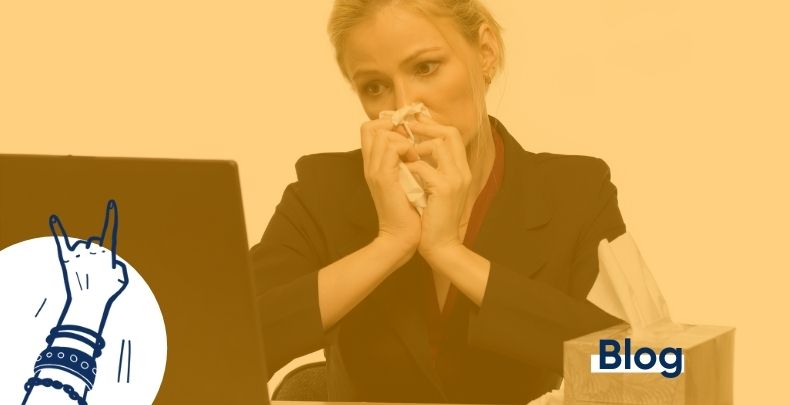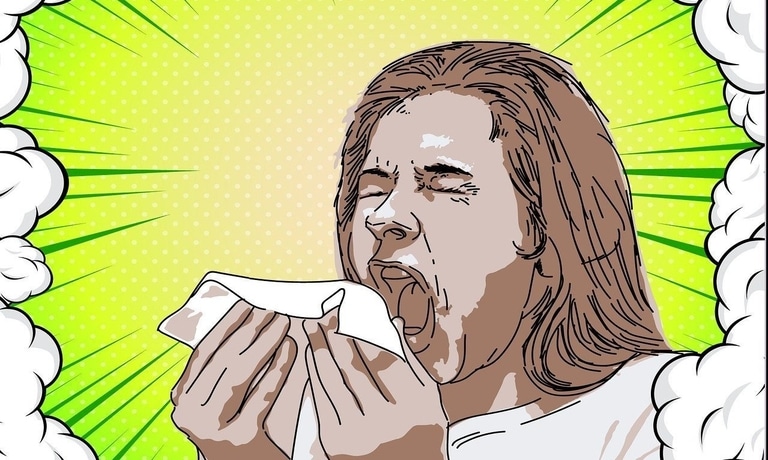

From colds to Covid: How to manage an outbreak of sickness at work.
Here we are, right in the middle of flu season, and suddenly that's not all we have to worry about anymore. The spread of the Coronavirus has quickly become the centre of a lot of discussion, and even panic as people have been quarantined and scientists work to understand a strain of viral illness that has never previously been observed in humans. So we thought today would be well spent discussing the sensible course of practice for dealing with contagious sickness at work.
What is Coronavirus?
While this guide is of a general-purpose in nature for addressing sickness at work, we would still like to address the elephant in the room. Although as a rule of thumb, we suggest you get your medical information from qualified medical professionals or accredited sources like the NHS website.
Coronavirus is the name given to a large family of viral illnesses including the common cold and SARS. Viruses in this family are zoonotic, meaning they can be transmitted from animals to humans. They can be transmitted via bodily fluids either through direct contact, coughing and sneezing, or indirectly with the contamination of objects and surroundings. The virus at the centre of the current panic was temporarily referred to by The World Health Organisation as Novel Coronavirus (2019-nCoV) and has not previously been observed in humans. Recently, the virus was officially named COVID-19 in reference to the year in which it emerged.
While over a thousand people in China have died from the virus so far, this is due to a variety of factors. Several government officials have been stripped of office due to supposed incompetence in their handling of the initial outbreak, for example. The World Health Organisation has stated that Coronavirus poses a much lower risk to those outside of China. It has also been found that the virus does not survive more than a few hours on physical objects, meaning packages delivered from China will not be contaminated. However, the fact is that a few cases have made their way back to the UK, stemming largely from expats and people on business trips. So while for most of us, this outbreak probably won't amount to more than scrolling past a few frantic headlines, the unlucky few are in for a rough time.
Similarly to WHO's assessment, the NHS has rated the likelihood of contracting Coronavirus in the UK as low, and its advice pertains specifically to people returning from China, or other regions in Asia such as Japan, Taiwan and Malaysia. If you think you have a viral infection, remember that it is statistically far more likely to be the flu.
I'm experiencing sickness at work, what should I do?
This is where things get a bit more general. The problem with diagnosing viral respiratory illnesses is the commonality between their symptoms. If you think you have a viral illness, the most effective way not to transmit it is not to go to work. While this does sound obvious, workplace culture can often make staff feel pressured to work while sick.
In terms of Influenza, the NHS recommends staying home for at least 24 hours after your fever breaks without the aid of fever-reducing medications such as ibuprofen. This isn't to say you shouldn't take those medications, just that they won't lessen the amount of time you're contagious for despite breaking your fever more quickly. People with the flu are at their most contagious during the first three days of illness. Unfortunately, the rules of thumb we use for Influenza don't necessarily apply to COVID-19, as too little is known about it.


If you have been travelling internationally and fear the worst about your symptoms, the NHS recommends avoiding other people for up to fourteen days after returning to the UK, as well as reporting your symptoms and area of travel to NHS 111 for further advice.
But some of us have work commitments too significant to even spend 24 hours waiting out flu symptoms, let alone 14 days. For those of you unlucky enough to have to deal with sickness at work as a result of the flu virus or anything else, we have some advice to help limit your contagiousness.
- Notify management or HR about your illness.
- Cover your mouth when you sneeze or cough.
- Wash your hands regularly. A bottle of hand sanitizer goes a long way here, especially when handling workplace equipment.
- Wherever possible, try to maintain a meter's distance from your colleagues. Any closer and they risk being infected by the droplets from your coughing and sneezing.
- Stay hydrated and take the proper medications to speed up recovery time.
- Get some rest as soon as you can. Working while ill can drag out the recovery process and damage your productivity.
Weekly10 helps me keep track of all my staff no matter where they are, whether they're office-based, working remotely, or on flexi-time.
Carl Turner - Townsquare
As an employer, what can I do to limit infection?
There are a few things you can do as an employer to help prevent sickness at work from spreading throughout your business. Additionally, depending on the condition, there are some things you are obligated to do, for staff and sometimes public wellbeing.
If at all reasonable, give your employee time off to recover. This may require some encouragement, as a study has found that 86% of working adults go into work with contagious illnesses. Almost a quarter feel pressured to work when ill, while 22% think their boss would prefer them to go into work with an infectious illness as long as it wasn't "œtoo serious." Giving staff time off to recover not only stems the tide of infection by keeping them away from their colleagues, but also benefits long-term productivity by enabling sick employees to recover faster, meaning they can get back to their best sooner.
In workplaces where sudden absences may be too disruptive, flexible working arrangements can be very useful in preventing the spread of infection. Allowing remote working helps you protect your other employees from getting sick, while keeping the contagious staff member productive.
It's also especially important during times such as flu season to maintain high sanitary standards. It's easy to put together basic sanitation stations around your office, containing things such as hand sanitizer, tissues and wet-wipes. Doing so is a cheap and effective way of minimising the rate of infection in your office.


Additionally, the Society for Human Resource Management has created a five-step guide of best practice for employers when dealing with infectious illnesses in the workplace. While SHRM is an American organisation, these steps are relevant for UK employers. As an employer, it is important you provide as high a standard of safety as is reasonably possible for employees who may come into contact with these illnesses, while respecting the legal rights of employees with infectious medical conditions, such as the right to privacy and job protections. The five steps outlined by SHRM to reduce sickness at work are:
- Notification and verification of disease risk.
- Understanding the disease and culling resources.
- Identifying the scope of the risk.
- Determining employer response.
- Handling internal and HR compliance matters.
Some organisations have tried to take a novel approach in encouraging their staff during this international outbreak. Law firm Allen and Overy made headlines recently when they distributed vitamin D supplements to their staff with a poorly-judged note reading: "˜A vitamin a day keeps the Wuhan away.' While these supplements can be beneficial for a healthy immune system, it ought to be made clear that they do not directly protect against viruses. COVID-19, Influenza and other respiratory viruses are most dangerous to the infirm, the old and very young. The best and only way to really protect these people is to reduce the spread of infection by preventing exposure.
Remember that our advice for dealing with sickness at work is quite general, and medical scientists are still researching the particulars of COVID-19. But so as long as everybody keeps calm, engages common sense and uphold high standards of sanitisation we'll get through this flu season like we have all the rest. If you happen to have just come home from backpacking around Asia, call NHS 111 for professional advice. But for everyone else, try not to let the media hype around the Coronavirus scare you too much.




